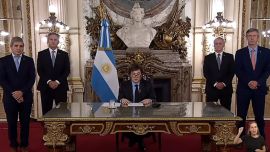Thus, Macri takes a step closer to the populists, betting on growth at the expense of controlling inflation.
A day after pushing the 2018 budget through the Senate — which put average inflation at 15.7 percent and the dollar exchange rate at $19.30 — the government announced it had changed its inflation goals for 2018, setting them at 15 percent from a 12 to 18 percent band previously. As the market opened on Thursday, the dollar soared past the 2018 projection to $19.46, capping off a 10 percent movement in just two weeks, as a defeated Central Bank lowered interest rates, pushing investors out of short-term paper (Lebacs) and into foreign currency. The official explanation, given by Marcos Peña, was “recalibration,” seconded by Treasury Minister Nicolás Dujovne who argued the new goals for inflation were “more predictable” and “strengthened credibility.”
Sturzenegger — the only one wearing a tie — was the clear loser. An orthodox economist, the Central Bank chief had been leading the fight against inflation through high interest rates and consistent communication, a page from former Fed chairman Ben Bernanke’s playbook. Only a few months ago, Sturzenegger — a monetarist, like Bernanke — suggested “changing the [inflation] targets is not having a target.”
The controversial side effect of the Sturzenegger doctrine was the ever-famous bicicleta financiera, a carry-trade generated by high interests on Lebacs (used to sterilise or absorb pesos) and an artificially low peso-dollar exchange rate, which performed brilliantly over the past two years to the benefit of speculators.
In a government that has already demonstrated its interest in discipline within its ranks, particularly on the economic front, it was indeed a rarity that the Sturzenegger doctrine lasted as long as it did. In the last week of 2016, then-economy minister Alfonso Prat-Gay was forced to resign for expressing his pragmatist views — and for being too visible, something Macri and Marcos Peña aren’t particularly fond of — while a few weeks later Carlos Melconian, the head of Banco Nación, was pushed out for criticising the economic gradualism and the debt-financing of the fiscal deficit set in motion by Dujovne and Finance Minister Luis ‘Toto’ Caputo.
While Sturzenegger has effectively lowered inflation quite dramatically, going from approximately 40 percent in 2016 to an expected 25 percent this year, his critics said he had drastically missed his targets, and they’re right. For 2016, the inflation target was set at 25 percent, while 2017 should’ve been in the 12 to 17 percent range.
Yet, as anyone who has followed central bank communication knows, the intention behind targets is not just to set a projection, it’s also normative, wishful, and that’s how undershooting the target should help set lower expectations. Central bank communication is so powerful that it can even causethe opposite effect: in 2013, Bernanke suggested the Fed would begin to “taper” its monetary stimulus of the market (known as quantitative easing, or QE) in the following months, sending the stock markets into a four month panic that ended once the Fed Chairman calmed investors, noting QE wasn’t going anywhere anytime soon.
Macri’s political message was heard loud and clear. Sturzenegger is fourth in line in making economic policy now, below Marcos Peña, Dujovne, and Caputo. The Central Bank’s sacrosanct independence, recovered by Sturzenegger at Macri’s behest (Cristina Fernández de Kirchner had eliminated it, let’s remember) has been put in question, severely weakening the strength of monetary communication.
The Macri administration has also taken a page from the Peronist populists, albeit timidly, by prioritising growth over inflation.
From 2018 to 2022, the government’s intention is to sustain economic growth at 3.5 percent annually, while indebtedness will rise from the current 28.5 percent to 37 percent of GDP, which in turn cause interest payments to grow to 2.1 percent of GDP, according to the government’s own projections.
It’s troubling to see a trade deficit that will hit US$9 billion this year, a historical record that is 50 percent higher than the previous record in 1994, and five times higher than projected by the government in the 2017 budget. As economist and journalist Marcelo Zlotogwiazda said recently, Argentina’s structural uncompetitiveness makes it difficult to envision a short-term solution to this issue, blowing a massive hole in our balance of payments that can only be corked with dollar-denominated debt. Equally as troubling is the fiscal deficit and primary spending, which will have a hard time falling as the government sustains and even expands social welfare.
At the end of the day, economic growth is the only solution for Macri, and he has no Plan B.
People will vote with their pocket, as they did in the populist days of Néstor Kirchner and Cristina Fernández de Kirchner in the midst of an inflation-powered consumption bubble.
Let us hope the summer breeze and the New Year will lead to improved economic conditions and political moderation on all sides, lest we’ll be listening the siren calls of populism once again.





















Comments